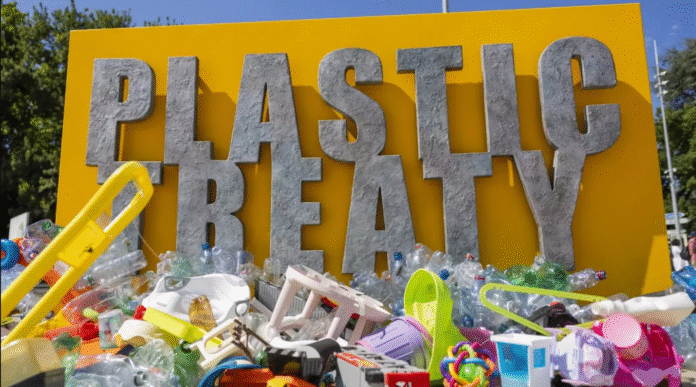Plastic Pollution Treaty Failure Sparks Global Disappointment
The plastic pollution treaty failure at the United Nations talks in Geneva has left environmentalists, diplomats, and campaigners deeply frustrated. After 10 days of intense negotiations involving over 1,000 delegates from around the world, no consensus was reached on what could have been the first legally binding global agreement to combat plastic pollution.
This setback not only delays urgent action but also raises serious questions about whether nations can unite to address one of the most pressing environmental crises of our time.
Why the Plastic Pollution Treaty Failure Happened
From the outset, hopes were high that these Geneva talks would lead to a breakthrough. Delegates from more than 170 countries gathered with the mission to finalize a framework that would regulate plastic production, reduce waste, and address the toxic chemicals in plastics.
However, divisions quickly emerged. A handful of oil-producing and petrochemical-heavy nations reportedly blocked stronger commitments, undermining the ambitious proposals championed by the European Union and small island states. These countries were pushing for strict limits on virgin plastic production, which is heavily dependent on petroleum, coal, and gas.
French ecology minister Agnes Pannier-Runacher did not hide her anger, telling delegates she was “enraged because despite genuine efforts by many, and real progress in discussions, no tangible results have been obtained.”
Colombia’s delegate Haendel Rodriguez echoed the frustration, accusing “a small number of states who simply did not want an agreement” of holding the process hostage.

A Process Under Fire
The plastic pollution treaty failure has led some to call the current negotiating process fundamentally broken. While the United Kingdom urged for talks to continue, others, such as South Africa’s delegate, bluntly declared: “It is very clear that the current process will not work.”
The Geneva meeting was the sixth round of negotiations under the Intergovernmental Negotiating Committee (INC). The last session, held in South Korea, also ended without a deal. This repeated deadlock has cast doubt on whether the treaty can be finalized before the UN’s self-imposed 2025 deadline.
Divisions Over the Core Issues
Several key points caused the deadlock:
-
Capping Plastic Production: Proponents argue that reducing production at the source is the only sustainable way forward. Opponents fear economic impacts on industries reliant on petrochemicals.
-
Banning Certain Chemicals: Many plastics contain hazardous substances harmful to human and environmental health. Proposals to phase them out were strongly resisted by some nations.
-
Financing for Developing Countries: Disagreements arose over how wealthier nations would support developing countries in implementing the treaty’s requirements.
The EU, supported by many environmental groups, believes the treaty must be bold, stating that plastic waste is “one of the biggest pollution problems we have on earth.”
The Stakes Couldn’t Be Higher
The plastic pollution treaty failure comes amid alarming scientific findings. Just weeks before the talks, researchers revealed that microplastics have been detected in human brain tissue, raising new health concerns. This follows years of evidence showing plastic contamination in oceans, rivers, soil, and even the air we breathe.
Plastic pollution is now a global crisis, with over 400 million tonnes of plastic waste produced annually. The UN warns that without decisive action, plastic in the oceans could triple by 2040, devastating marine life and threatening food security.
What Happens Next?
Despite the Geneva disappointment, many delegates have vowed not to give up. Danish environment minister Magnus Heunicke, speaking on behalf of the EU, said: “We will keep on working until we have a treaty that will help us solve the problem.”
Some countries are calling for smaller, focused negotiations to bypass political deadlock. Others are pushing for voluntary agreements and regional pacts while waiting for a global deal.
Why the World Can’t Afford More Delays
Plastic pollution is not just an environmental problem, it’s a public health, economic, and climate issue. Plastics are made from fossil fuels, meaning their production contributes to greenhouse gas emissions. They also harm tourism, fisheries, and agriculture when waste invades natural environments.
Every year, millions of animals from seabirds to turtles die after ingesting or becoming entangled in plastic debris. Human health risks, from toxic chemicals to microplastics entering the bloodstream, are becoming increasingly clear.
The Role of Public Pressure
Past environmental treaties, like the Paris Climate Agreement, show that public awareness and activism can force governments to act. The growing global movement to ban single-use plastics, expand recycling, and hold corporations accountable is proof that change is possible when citizens demand it.
If public outrage over the plastic pollution treaty failure gains momentum, governments may feel pressured to compromise in the next negotiation round.

How You Can Take Action Now
While world leaders argue, individuals can still make a difference:
-
Reduce Single-Use Plastics: Choose reusable bottles, bags, and containers.
-
Support Policy Change: Join campaigns pushing for stronger environmental laws.
-
Hold Companies Accountable: Support brands with sustainable packaging.
-
Educate and Share: Spread awareness about the impact of plastic pollution.
For resources and global updates, visit UNEP’s plastic pollution hub and Greenpeace International.

